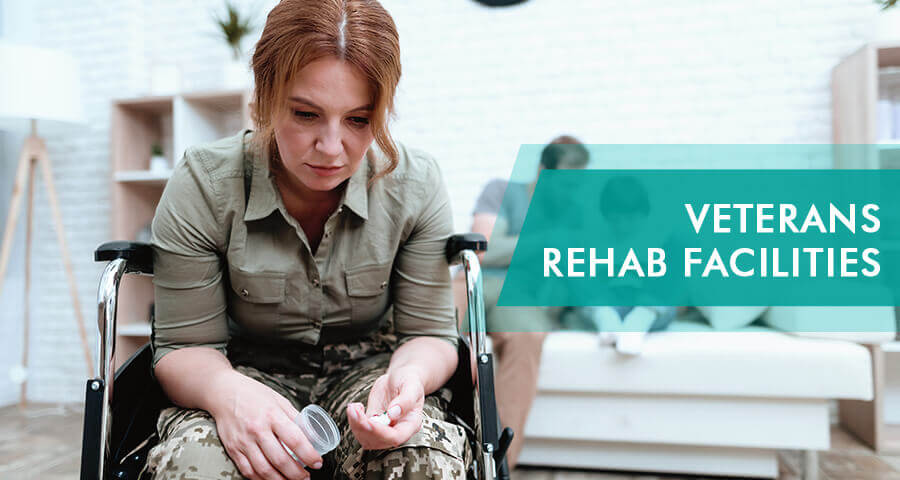
The United States is home to approximately 19 million veterans, a diverse group shaped by service in wartime conflicts, peacekeeping missions, and other military operations.
While their sacrifices are commendable, many veterans face significant challenges upon reentering civilian life, including trauma, post-traumatic stress disorder (PTSD), chronic pain, and other service-related conditions. These stressors, compounded by the difficulties of reintegration, contribute to a higher prevalence of substance use disorders (SUDs) among veterans compared to the general population.
Addressing substance abuse within this community is essential, requiring comprehensive, specialized care and robust support systems to foster recovery and improve quality of life. In this article, you will learn about statistics, risk factors, special programs, and coverage for substance abuse disorders available for veterans.
Table Of Contents:
Substance Abuse Disorder in Veterans
Veterans face unique challenges that heighten their risk of substance use disorders (SUDs). According to the National Institute on Drug Abuse (NIDA), roughly 11% of veterans treated at Veterans Health Administration (VHA) facilities have SUDs, nearly double the rate in the general population.
In 2020, data from the Substance Abuse and Mental Health Services Administration (SAMHSA) highlighted key trends among veterans aged 26 or older regarding substance use and related disorders. According to SAMHSA, approximately 55.0% of veterans reported consuming alcohol within the past month.
The data also showed that 7.5%, or about 1.5 million veterans, reported using illicit drugs within the same timeframe. Marijuana use was prevalent among 6.3%, translating to approximately 1.2 million individuals, while opioid misuse affected 2.4% or about 480,000 veterans. Furthermore, 0.4% of veterans, around 80,000 people, were found to have an opioid use disorder within the past year.
Risk Factors Faced by Veterans
The transition from military service to civilian life presents a significant challenge for many veterans, and this contributes to increased substance abuse risks and the need for rehabilitation.
Veterans often move from a structured military environment to an unpredictable civilian world, facing difficulties such as finding employment, building new social connections, and rebuilding family relationships.
According to The US Department of Veterans Affairs, nearly 20% of veterans suffer from PTSD or major depression, and over 11% of veterans treated at Veterans Health Administration facilities are diagnosed with substance use disorders. These issues are exacerbated by feelings of isolation, lack of purpose, and the challenge of relating to civilians who have not shared similar experiences.
Mental health conditions such as PTSD, depression, and anxiety are common among veterans. PTSD is particularly prevalent among those who have been exposed to combat or traumatic events, manifesting as intrusive memories, heightened stress responses, and emotional distress.
Depression and anxiety are also widespread, further deepening feelings of despair, irritability, or hopelessness. In an attempt to manage or escape these overwhelming emotions, many veterans may turn to alcohol, prescription drugs, or illicit substances.
| Risk Factor | Description |
|---|---|
| Combat Exposure & Trauma | Veterans exposed to combat and traumatic events are at a higher risk of developing PTSD, which is closely associated with substance use as a coping mechanism. |
| PTSD | Post-Traumatic Stress Disorder is common among veterans and often involves flashbacks, anxiety, and hyperarousal, making substance use an escape mechanism. |
| Mental Health Conditions | Depression, anxiety, and other mood disorders are prevalent in veterans, contributing to the use of substances as a form of self-medication. |
| Chronic Pain | Injuries sustained during service often lead to chronic pain, resulting in higher rates of prescription opioid use, which can lead to dependency. |
| Difficult Transition to Civilian Life | Veterans face challenges such as finding employment, establishing new social connections, and reconnecting with family, which may lead to substance use. |
| Isolation and Lack of Support | Many veterans feel isolated or struggle to relate to civilians, increasing emotional distress and the likelihood of substance use for temporary relief. |
Addiction as a VA Disability
Addiction can be recognized as a VA disability when it is secondary to another service-connected condition, such as PTSD.
This allows veterans to receive disability compensation if they can establish that their substance use disorder was caused or exacerbated by their military service or by another service-related disability.
Such recognition is vital, as it underscores the complex interplay between military service and addiction, acknowledging the need for comprehensive treatment and support.
Veteran Rehab Programs for Substance Abuse Recovery
To address the unique challenges faced by veterans with substance use disorders, several dedicated programs have been developed to support recovery and long-term well-being.
The Veterans Affairs (VA) Substance Abuse Program offers a comprehensive, evidence-based approach that includes detoxification, residential and outpatient treatment, individual and group therapy, and medication-assisted treatment (MAT). Tailored specifically to veterans, these programs often incorporate mental health care to address co-occurring disorders like PTSD.
The VA also provides specialized residential treatment facilities offering immersive care designed to stabilize patients, teach coping mechanisms, and facilitate their reintegration into society through intensive therapy and structured routines in a supportive environment. Peer support groups, both within and outside of the VA, enable veterans to connect with others who share similar experiences.
Additionally, the VA’s Vocational Rehabilitation and Employment (VR&E) program, also known as Chapter 31, assists veterans with service-connected disabilities in acquiring the skills needed to secure and maintain meaningful employment. This includes career counseling, job training, and educational assistance, which play a vital role in recovery by providing purpose, alleviating financial stress, and promoting self-esteem.
| Program | Description |
|---|---|
| VA Substance Abuse Program | Comprehensive care for substance use disorders, including therapy, detox, and MAT, often with mental health support for conditions like PTSD. |
| Specialized Residential Treatment | Stabilizes veterans, teaches coping skills, and aids reintegration through structured care. |
| Peer Support Groups | Connects veterans to share experiences, providing encouragement and reducing isolation. |
| VA Vocational Rehabilitation (Chapter 31) | Offers career counseling, job training, and educational support to help veterans with disabilities achieve meaningful employment. |
Veteran Rehab Services Available
The Department of Veterans Affairs (VA) operates approximately 250 residential rehabilitation treatment programs at around 120 sites nationwide, providing over 6,500 beds for Veterans.
Many VA medical centers, community-based outpatient clinics, and Vet Centers offer outpatient substance use disorder (SUD) treatment services.
The VA ensures that Veterans have access to a comprehensive range of SUD treatment options across various care settings.
How to Access Veteran Rehab Services
Accessing substance abuse services through the VA starts with reaching out to a local VA medical center or outpatient clinic. Veterans can also connect with VA resources through the Veterans Crisis Line, which is available 24/7 for immediate support.
Enrolled veterans can speak with a healthcare provider to develop a personalized treatment plan, which may include medication, therapy, and support group recommendations. Private rehab centers also offer tailored services for veterans and often work closely with military insurance providers to ensure affordability. Some centers have specific programs designed to address combat trauma and other military-specific issues, ensuring a comprehensive approach to care.
Veteran Rehab Centers
Here is a list of top-rated veteran rehab centers:
| Facility Name | Location | Services Offered |
|---|---|---|
| Heroes’ Mile | DeLand, FL | Veteran-exclusive residential treatment, detoxification, and mental health services |
| The Meadows | Wickenburg, AZ | Comprehensive treatment for trauma and addiction, including programs for veterans |
| Refuge a Healing Place | Ocklawaha, FL | Residential treatment center specializing in PTSD and substance abuse for veterans |
| The Recovery Village Ridgefield | Ridgefield, WA | Offers a veterans track with specialized therapy and support |
| Caron Treatment Centers | Wernersville, PA | Provides a veterans program focusing on addiction and co-occurring disorders |
| The Steven A. Cohen Military Family Clinic at Centerstone | Clarksville, TN | Outpatient mental health care for veterans and their families |
| Rushford | Meriden, CT | Offers specialized programs for veterans dealing with substance abuse and mental health issues |
| The Vet Center Program | Nationwide | Community-based counseling centers provide a range of services to veterans |
| The Veterans Healing Farm | Hendersonville, NC | Provides a therapeutic environment for veterans through farming and community |
Insurance Coverage for Veteran Rehab
Access to rehabilitation services is often facilitated through the VA, which provides substance abuse treatment without out-of-pocket costs or with minimal co-pays for eligible veterans.
This includes a range of services, from inpatient detoxification to long-term counseling and outpatient care. Additionally, private insurance, TRICARE, Medicare, and Medicaid can cover substance abuse treatment, offering veterans more options for tailored care.
Veteran Rehab – A Sensitive Approach
Rehabilitation for veterans dealing with substance abuse requires a tailored approach that recognizes their unique experiences and challenges.
From VA-sponsored substance abuse treatment to comprehensive vocational training and holistic aftercare, the path to recovery is multifaceted.
With the right resources and community support, veterans can achieve lasting recovery, regain purpose, and lead fulfilling lives beyond their service years.
Hope Without Commitment
Find the best treatment options. Call our free and confidential helpline
Most private insurances accepted
Find Drug Rehabilitation Centers Near You Anywhere In the US
Addiction Resource team has compiled an extensive list of the top drug rehabilitation facilities around the country. Use our locator tool to find the best centers near you.
Page Sources
- National Institute on Drug Abuse: Substance Use and Military Life Drug Facts
- SAMHSA: 2020 National Survey on Drug Use and Health: Veteran Adults
- The US Department of Veterans Affairs: PTSD: National Center for PTSD
- The US Department of Veterans Affairs: VA Mental Health Residential Rehabilitation Treatment


 Reviewed by:
Reviewed by:  Written by:
Written by: 

 FindTreatment.gov
FindTreatment.gov